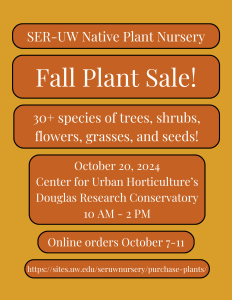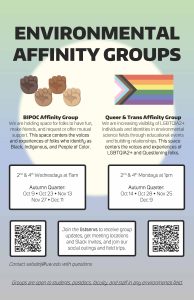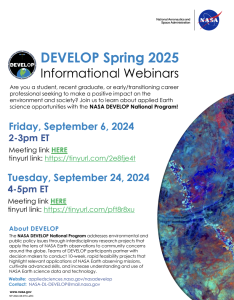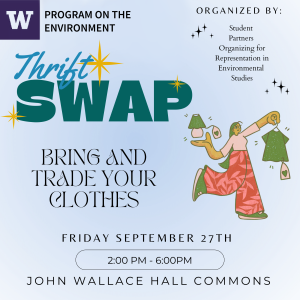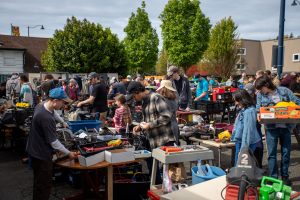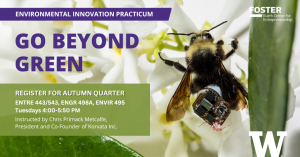The SER-UW Native Plant Nursery’s fall sale is happening now! Our in person plant sale will take place on Sunday, October 20th, at the Douglas Research Conservatory from 10 AM to 2 PM. Plenty of plants are still available, and there are a few exciting plants and bulbs that will be available at the in person sale only. Happy shopping, and thank you for your support! Contact sernursery@gmail.com with any questions.
FieldSound Podcast featuring Eli Wheat and the UW Farm
PoE’s own Eli Wheat was featured on the most recent episode of FieldSound, the College of the Environment’s podcast, to talk about sustainable farming and our relationship as humans with the land and food we consume. Tune into this episode to learn about Eli’s work with the UW Farm and SkyRoot, his own farm on Whidbey island, which utilizes an ecosystem approach to agricultural land management.
College of the Environment Affinity Groups
Environmental BIPOC Affinity Group
The Environmental BIPOC group is a respectful and supportive space to build community, share experiences, and support each other. Sometimes we get food together. This group is intended as a social space for folks to chill, make friends, and offer mutual support.
- 2nd and 4th Wednesdays at 11am (tentative, might change!)
- Autumn quarter: October 9, October 23, November 13, November 27, December 11
- Will be meeting in-person at a local cafe
This group centers the voices and experiences of Black folks, Indigenous folks, and other folks who identify as people of color. Join the Environmental BIPOC listserv to see group updates, get the meeting locations, and keep up to date with events. You can also join us on Slack.
Environmental Queer & Trans Affinity Group
The Environmental Queer & Trans group is a respectful and supportive space to build community, share experiences, and support each other. The Queer & Trans group works to increase visibility of LGBTQIA2+ individuals and identities in environmental science fields through educational events. And it’s a cool place to build relationships and make friends!
- 2nd and 4th Mondays at 1pm
- Autumn quarter: October 14, October 28, November 25, December 9
- Will be meeting in-person at a local cafe
This group centers the voices and experiences of LGBTQIA2+ and Questioning folks. Join the Environmental Queer and Trans Affinity listserv to see group updates, get the meeting locations, and keep up to date with events. You can also join us on Slack.
PoE Students Aid in Puget Sound Dungeness Crab Research
 PoE students in the news! Check out this article in the Seattle Times focused on Dungeness crab, which features Pacific Northwest Crab Research Group’s larval crab monitoring and includes a photo of one of our PoE students, Annie Schlanger, doing her capstone research. The Shilshole marina site where Annie worked this summer was staffed almost entirely by PoE and Marine Biology students from UW during the past season (April – September). Read more about the plight of the Dungeness crab in the Puget Sound, and how current research is contributing to conservation efforts.
PoE students in the news! Check out this article in the Seattle Times focused on Dungeness crab, which features Pacific Northwest Crab Research Group’s larval crab monitoring and includes a photo of one of our PoE students, Annie Schlanger, doing her capstone research. The Shilshole marina site where Annie worked this summer was staffed almost entirely by PoE and Marine Biology students from UW during the past season (April – September). Read more about the plight of the Dungeness crab in the Puget Sound, and how current research is contributing to conservation efforts.
NASA DEVELOP Spring 2025 Internships
NASA DEVELOP is an applied science, capacity-building program in NASA’s Earth Science Division. In collaboration with partner organizations, NASA DEVELOP conducts 10-week feasibility studies that address local, national, and international environmental and policy concerns using data collected by NASA’s Earth-observing fleet of satellites. NASA DEVELOP operates at thirteen locations across the country at NASA Centers and other regional locations.
As a capacity-building program, DEVELOP offers program participants opportunities to learn about Earth science and develop research, collaboration, and science communication skills. NASA DEVELOP research teams are interdisciplinary and built around members from diverse backgrounds, differing skill levels in Earth science research and science communication, and the unique experiences and strengths each participant brings to a team. No previous experience in Earth science research is necessary for these positions, and applicants with backgrounds in other fields of study are encouraged to apply.
Details about this opportunity and how to apply can be found at https://appliedsciences.nasa.gov/nasadevelop. Applications for the Spring 2025 term (January 27th-April 4th) are due this Friday, October 4th, with recommendations due October 18th. Weekly work schedules are flexible, but applicants should be able to commit to 20 – 29 hours of work per week during the project term. These positions are paid on an hourly basis, and pay rates are determined by education level and geographic location. A list of planned projects with their associated NASA DEVELOP locations is attached to this email. Please note that some DEVELOP locations allow for in-person opportunities while others are virtual. For virtual locations, all accepted participants must work remotely from within the United States.
UW Dawg Daze Thrift Swap
Join us THIS FRIDAY from 2 – 6PM down in Wallace Hall for an exciting Dawg Daze event in partnership with PoE RSO SPORES! Bring your unwanted clothing items to participate in a thrift swap and enjoy light refreshments. All unclaimed clothing items will be donated after the event. Now is a great time to clean out your closet and snag some new items for the start of the school year!
Seattle REconomy Tool Sale
Tool Sale @ NE Seattle Tool Library (9/21): All Offers Accepted!
Seattle REconomy is hosting a Tool Sale at the NE Seattle Tool Library (NESTL) on September 21st from 9am–3pm! This event is free and open to the community. Whether you are putting together your furniture, starting DIY projects, or need tools for school, our Tool Sale can help you out! You could even purchase a bike to make commuting easier or get gear for some outdoor adventures.
With that, not only will there be thousands of tools for sale, but we’ll also have several bikes, outside gear, a bake sale, t-shirt making, and tours of NESTL! There will also be a special offer for new members: A 15% off coupon for our ReUse Building Materials Shop at the Shoreline Tool Library!
Categories of tools available include power tools, landscaping, hand tools, electrical, painting, plumbing, kitchen, building materials, and so much more available for ANY price!
- $10 for a circular saw, no problem.
- $5 for a shovel, sure.
- A knowing nod for a screwdriver? As long as it’s sincere, it’s a deal!
Our goal for these Tool Sales is to keep tools out of landfills and make tools more accessible. The addition of gear in partnership with GeerGarage also helps keep outdoor gear in use and connects nature lovers in the area.
The NE Seattle Tool Library is most accessible to UW students through the 372 bus that runs around campus. Folks tend to start lining up one hour before the event starts.
You can let us know you’re coming by signing up here! All proceeds support the Seattle REconomy community and our tool libraries in NE Seattle and Shoreline. Please email info@seattlereconomy.org if you have any questions.
Location: NE Seattle Tool Library (10228 Fischer Pl NE)
Date: Saturday, September 21
Time: 9am-3pm
Apply Now: Assistant Teaching Professor, Environmental Studies
The University of Washington Program on the Environment (PoE) invites applications for 2 faculty positions at the level of Assistant Teaching Professor in any field of Environmental Studies. These positions may teach courses in at least one of the following areas:
- Bioregional natural history
- International socio-ecological issues
- Quantitative and qualitative data analysis
- Environmental justice
Positions are full-time (100% FTE) over a 9-month service period with additional possible summer teaching. The intial appointment is 3 years. After the initial appointment, they can be renewed up to 5 years as an Assistant Teaching Professor. Teaching faculty are ineligible for tenure. All teaching responsibilities will be in the Program on the Environment (PoE); however, the academic appointment will be based in an academic appointing unit within the College of the Environment, depending on interests and expertise of the successful candidate. Teaching Professors are full voting members of their academic appointing unit faculty. The anticipated start of the position is September 16, 2025.
The base salary range for this position is $8,500 to $11,000 per month commensurate with experience and qualifications, or as mandated by a U.S. Department of Labor prevailing wage determination. Other compensation associated with this position may include start-up funds, lump sum moving allowance and/or a relocation incentive.
All UW faculty engage in teaching, scholarship, and service. The Teaching Faculty in the PoE are long-term educational professionals who combine instructional excellence with a variety of leadership, community building, outreach, advancement of pedagogy, and disciplinary scholarship work.
Autumn Course: ENVIR 495 A, Environmental Innovation Practicum
Environmental Innovation Practicum (2 credits, credit/no-credit) | Tuesdays | 4 to 5:50 pm
Jointly-listed: ENVIR 495, ENTRE 443/543, ENGR 498A
Interested in finding solutions to today’s climate and environmental challenges? Take this Autumn Quarter class and find out how! The environmental innovation practicum (ENVIR 495, ENTRE 443/543, ENGR 498A) is instructed by Christian Primack Metcalfe, president and co-founder of Korvata, a company he was inspired to create as a student in this exact class! Each week you’ll fill your toolbox with new skills and problem-solving experience while also engaging with guest speakers from multiple sectors. This 2 credit/no credit course is open to all levels of undergraduates and graduate students providing a great opportunity for these groups of students to connect. An idea you work on as part of the class could even gain enough traction to do well in the Environmental Innovation Challenge. Questions? E-mail Lauren Brohawn at brohal@uw.edu.
Reuse Seattle Volunteer Opportunity
Are you interested in supporting reuse efforts in Seattle? Look no further!
Reuse Seattle is a City of Seattle initiative, partnering with community events throughout the city to
pilot reusable dishware. To ensure a successful pilot, we need to educate event attendees to return
their reusable dishware–because there is no reuse without returns!
We are looking for volunteers to stay near the return stations at events, direct attendees to return
their reusable dishware, and educate attendees about the pilot and the benefits of reuse. Volunteers
will receive:
(1) Volunteer training
(2) A complimentary Reuse Seattle t-shirt
(3) A promo code for a membership with Okapi — a reusable cup program in participating cafes
Interested in supporting and attending some incredible Seattle events? Fill out the volunteer form
below!
